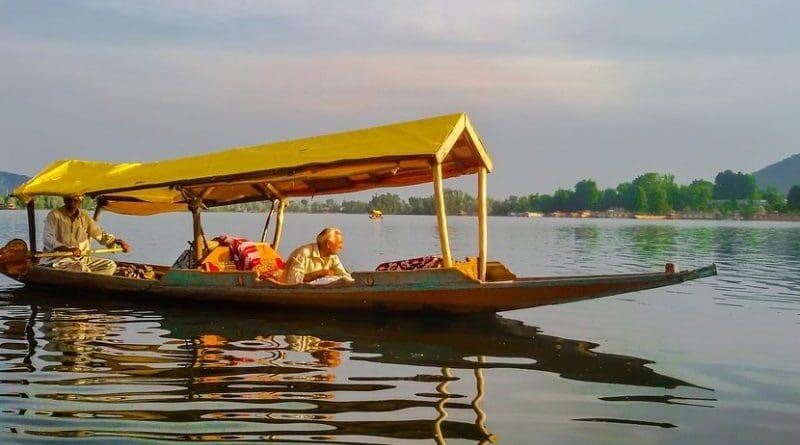Kashmir’s Uncertain Future: Reactions To Supreme Court’s Article 370 Verdict – Analysis
By Institute of South Asian Studies
By Imran Ahmed and Muhammad Saad Ul Haque
On 5 August 2019, Indian Home Minister Amit Shah announced to the parliament that the President had signed a decree abrogating Article 370 of the Constitution, which had given the people of Indian-occupied Kashmir substantial autonomy. Shah, a close aide of Prime Minister Narendra Modi and one of the leaders of the Bharatiya Janata Party (BJP), argued that Article 370 was anti-women, detrimental to the state’s development and the reason behind poverty in the region. He also maintained that “Article 370 was the root of terror in Jammu and Kashmir. It is time for it to go… if it doesn’t go today, we can’t remove terrorism from Jammu and Kashmir.”
Prominent Kashmiri political leaders of the time, Omar Abdullah and Mehboob Mufti, were vocal about their outrage over the government’s decision. Both leaders questioned the legal validity of the abrogation and implicated the BJP in causing further dissent in Kashmir. While the BJP and many of its allies were supportive of the move to abrogate Article 370, the official Congress’ position was to condemn the decision. The Congress’ stance was further echoed at the time by the Jammu and Kashmir Peoples Democratic Party, Janata Dal, Dravida Munnetra Kazhagam, Rashtriya Janata Dal, Trinamool Congress Party and the Nationalist Congress party. The abrogation of Article 370 escalated tensions and sparked nationwide dissent. In Kashmir, the government limited political mobilisation and civil liberties, with internet shutdowns and restrictions on medical and educational access. Fast forward to the December 2023 Supreme Court verdict – the atmosphere in Kashmir Valley remains tense.
Zafar Choudhary, a Kashmiri political commentator and author, noted his disillusion stating, “There is no ground left now. There used to be a ground around which the people would revolve now that ground is not there.” The feelings of many Kashmiri Muslim residents towards the Supreme Court verdict are the same as that of the 2019 decision to abrogate Article 370 – fear, anger and shock. According to Irshad Ahmad, a university student from Srinagar, there was an overt threat to the people, and when referring to the government said, “…[it has] retained draconian preventive detention laws, so clearly, Kashmiris have the right to be cynical about whatever the Indian government wishes to do here.”
Kashmiri reactions toward the Supreme Court Verdict are indicative of the uncertain situation on the ground. Perhaps the most pressing issue is the upcoming elections due in April/May 2024. Recent events have eroded trust and confidence in the Indian democratic system. The Supreme Court verdict has also exacerbated local anxieties of state centralisation over Kashmiri matters. Moreover, leading up to the G20 summit in India, Kashmir saw continued scufflesbetween separatists and Indian security services in Srinigar. In the last one year, militants from the valley have increased the frequency of their attacks against Indian security forces.
Despite the BJP’s pledge to create additional job opportunities for Kashmiri residents, the state’s unemployment rate surged to 18.3 per cent at the beginning of this year, surpassing the national average of eight per cent. In December 2023, Kashmir experienced an 80 per cent rain deficit, heightening worries among farmers and officials about water shortages and food security. Currently, there is grave concern among Kashmiris about the effects of climate change on their tourism and agricultural productivity. The winter period, which usually sees a lot of snow that contributes to a tourist industry primarily linked to winter sports, has gradually become less cold which is having detrimental economic implications for the Kashmiris. The unpredictability of the weather is affecting the farmers and fruit growers, and contributing to an increasingly vulnerable agricultural sector.
Additionally, a 2020 domicile law allowing non-Kashmiri residents to settle permanently and own land has raised concerns among Kashmiris that they will be discriminated by these settlers and in effect become second-class citizens. The approaching elections carry significant consequences for Kashmiris. Having navigated an unpredictable political landscape in recent years and grappling with uncertainty regarding their constitutional status, the people of Kashmir find themselves with a lack of local leadership. With the tenure of panchayats in Kashmir reaching their term end, and a call for elections looking unlikely, there are concerns among local village leaders about a lack of representation for Kashmiris to deal with local problems. All these issues contribute to the complex and uncertain future of Kashmir.
- About the authors: Dr Imran Ahmed is a Research Fellow at the Institute of South Asian Studies (ISAS), an autonomous research institute in the National University of Singapore (NUS). He can be contacted at [email protected]. Mr Muhammad Saad Ul Haque is a research analyst at the same institute. He can be contacted at [email protected] The authors bear full responsibility for the facts cited and opinions expressed in this paper.
- Source: This article was published by Institute of South Asian Studies (ISAS)


Comparing the two Kashmirs: While so called Azad Kashmir by Pakistan but in reality the POK (Pakistan Occupied Kashmir ) continues to face a step-motherly treatment whereas, J&K is received in 2024-2025 interim budget fund allocation that is more than four-and-a- a-half times more than the amount sought by Islamabad from the IMFfor the whole of Pakistan, gives a fair idea of the stark difference between J&K and the POK.Besides other privations, lack of educational facilities continues to remain a major area of concern for the people . November 2023 ANI report highlights the pathetic condition of educational facilities in Gilgit-Baltistan. (refer to Pathetic Educational Facilities In Illegally Occupied Jammu And Kashmir – OpEd)
How about the Kashmiri Pundits whose traditional lands and property were confiscated and driven into exile by Muslim extremists who were aided and abetted by political leaders in the State. Will the pundits be allowed to return and their property restored to them?